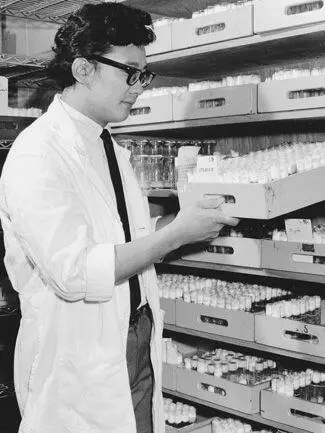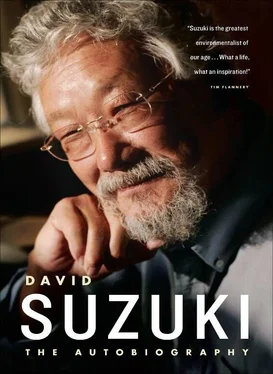
Starting out as a fruit fly geneticist at UBC, when doing good basic science was all that was required to receive a grant. (Don't be fooled by the lab coat, which I seldom wore.)
When I began my career as a scientist, we took pride in exploring basic ideas of the structure of matter, the origin of the cosmos, or the structure and function of genes without having to justify the expansion of human knowledge. Medical genetics was considered intellectually inferior to the kind of work we carried out with fruit flies.
In 1972, a special Canadian Senate committee under Maurice Lamontagne had examined the role science plays in society and concluded there was a need to tie research more directly to society's needs. “Mission-oriented” work was to be encouraged, presaging the enormous pressure that would be put on scientists to make their work economically useful. Scientists are led, by necessity, by the priorities underlying the granting procedure. If good basic science is all that is required to receive a grant, then scientists will be much more honest about what they are doing. But when there is pressure to find a cure for cancer, for example, then scientists engage in a game that ultimately undermines science by creating a false impression of what science is.
Why do we support science? Former Canadian prime minister Pierre Trudeau seemed to feel science is a frill we support when times are good. I couldn't disagree more. We support science because it is a part of what it means to be civilized, pushing back the curtains of ignorance by revealing bits and pieces of nature's secrets. But more and more, we are under a demand that science deliver practical uses. This is a dangerous requirement, because it imposes an urgency that can lead to shortcuts, unwarranted claims, and deception.
Canadian scientists make up a very small proportion of the total number of scientists around the world. Our total grant money is minuscule compared with the U.S. total, and globally, it is even less. If we assume the quality of science is about the same everywhere, then on average perhaps 2 percent of important discoveries will be made in Canada. Thus, the probability that some fundamental “breakthrough” (how I hate that misused and overused word) will be made here is very small, and one might suppose that Trudeau was right — we should simply parasitize the world's literature and focus on rapid capitalization of new ideas.
But that is not how science works or how it leads to applications. The really exciting creative moments are in conversation with leading scientists at conferences and on visits, or in closed meetings where a handful of the elite in a field gather to bat around ideas that are still in the embryonic phase and not available in publications. Such meetings are exciting, creative, and exclusive, open only to the top people. That's why we support the members of our small but top-notch Canadian scientific community — they are the price of a front-row seat at the action. Without them, we aren't plugged in to the cutting-edge work going on around the world.
Canada's granting process was an outmoded system that worked when there wasn't a lot of pressure and the community was small. I sat on one of the granting panels that chose which applicants would be funded and was surprised at how much political considerations entered into the final awards. We scientists on the grant panel spent a lot of time assessing and rating the applications on their scientific merits as best we could and then allocating the funds. But our decisions were only recommendations, which we submitted to the National Research Council. When the final decisions were announced, it was obvious that additions and deletions had been made to our recommendations according to geographic distribution and whether an institution seemed to have a disproportionate amount or was shut out of any support. It was a ridiculous way to give out money. Our policy seemed to be: pee over a broad expanse of ground and hope plants will sprout up everywhere. But if our bladder is small, we should at least direct the fertilizer to where the seeds are, not sprinkle it around.
When I was still active in research, Canadian granting agencies didn't seem to have the courage to identify the outstanding scientists and provide them with as much money as possible while turning down the rest. Today, much larger sums of research money are allocated and the rejection rate is much higher, but when I had a lab most applicants got grants at very low levels of support. We should focus on new, young scientists, because at the start of their careers, they are ambitious and have the energy to work hard. They are the ones who should be given substantial funding with few formal demands other than following wherever their interests lead for three or four years. At that point, they will have a body of work that can be evaluated for originality, quality, and quantity. From then on, those who have done promising work can be supported very well. We don't create excellence by funding institutions or infrastructure — it is individuals to whom we should pay attention and provide support.
Science has never been considered an important part of Canadian culture or celebrated in the way we celebrate the arts. Wisely, the Science Council of Canada was established as a Crown corporation, supposedly with an arm's length relationship with government. I say “supposedly” because when Stuart Smith, who was leader of the Liberal party of Ontario, became head of the Science Council, he had a difficult time reappointing me to the board for a second term because of a B.C. senator who opposed it. Nevertheless, in a time when the most powerful effect on our lives and our society is science, we need a body to look at the implications and provide counsel to guide us into the future. In 1993, Prime Minister Brian Mulroney abolished the Science Council (along with the Economics Council), thereby ensuring that we would move into the future with greater uncertainty and make decisions for political reasons, ignoring science-based assessments of the issues.
the former host of CBC Radio's Morningside , Peter Gzowski, richly deserved the adulation expressed upon his untimely death in 2002. Gzowski was quintessentially Canadian. I cannot imagine him or someone like him with his stuttering, humble, low-key way making it as a star in London or New York. But in Canada, he touched a deep chord.
He interviewed me a number of times on Morningside , and I had also appeared several times on his painful venture into television, 0 Minutes Live . There was much resentment within the Nature of Things unit about the money lavished on Gzowski's television program, but I loved the idea of a nightly showcase for Canadian talent. It's unfortunate that what worked so well on radio was a disaster on television. Gzowski felt I was a strong contributor, and he wanted me to appear as a regular on the show. I was flattered, but I didn't want to simply be a reporter on the “Golly, gee whiz, what will they think of next?” or “Isn't that scary?” aspect of science, so I declined.
One of the high points of my appearances on 0 Minutes Live was the night I appeared with Kurt Vonnegut Jr., and Timothy Leary. Vonnegut and I got on famously, and we were both appalled at Leary, who was in his phase of pushing SMIILE, which stood for Space Migration, Intelligence Increase, Life Extension, the kind of techno-optimism that makes my teeth ache. It was great television, and the sparks were flying between the three of us when Peter broke in for a commercial. When the break was over, we were cut off, and he went on with the next act, which was a man with a bullwhip knocking cigarettes out of his son's mouth.
Читать дальше



![David Jagusson - Devot & Anal [Hardcore BDSM]](/books/485905/david-jagusson-devot-anal-hardcore-bdsm-thumb.webp)









